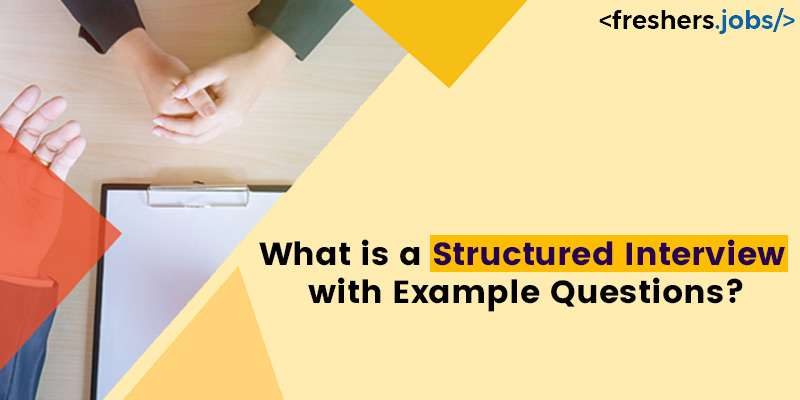A structured interview is a standardised and systematic approach used in the hiring process to assess a candidate’s qualifications, skills, and suitability for a specific role. Unlike unstructured interviews that rely on informal conversations, structured interviews involve a predetermined set of questions that are asked in the same order to all applicants. These questions are designed to gather consistent and relevant information, enabling fair comparisons between candidates.
The structured interview format reduces bias and ensures a more objective evaluation. Organisations can effectively evaluate candidates’ qualifications, skills, and potential fit for a position by employing a structured interview while maintaining a consistent and fair assessment process for freshers jobs.
Initially, let us know what a structured Interview is
What is a structured interview? A structured interview is a systematic and standardised approach in various fields, including recruitment, research, and performance evaluations. It involves asking a predetermined set of questions in a consistent manner to all interviewees. Unlike unstructured interviews, where the conversation may be more spontaneous and open-ended, structured interviews follow a specific format and focus on gathering specific information relevant to the interview’s purpose.
These interviews typically employ a list of predetermined questions involving the candidate’s skills, qualifications, experience, problem-solving skills, and behavioural traits. By using a structured interview approach, organisations can ensure fairness, consistency, and objectivity in their evaluation process, as each candidate is assessed based on the same set of criteria. Additionally, structured interviews reduce the potential for interviewer bias and provide a reliable framework for comparing and selecting the most suitable candidates for a particular job opportunity or research study.
Types of Questions Asked in Structured Interview
Behavioural Questions
Behavioural questions are structural questions and examples designed to understand how a candidate has behaved or responded in specific situations in the past. They provide insights into a candidate’s past experiences and ability to handle similar scenarios in the future. Examples of behavioural questions include:
- “Tell me about a time when you faced a challenging deadline and how you managed to meet it.”
- “Describe a situation where you had to resolve a conflict within a team and the approach you took to resolve it.”
Situational Questions
Situational questions present hypothetical scenarios to assess a candidate’s problem-solving skills, decision-making abilities, Logical thinking skills and judgment. These questions gauge how a candidate would handle certain situations if faced with them in the workplace. Examples of situational questions include:
- “How would you handle a situation where a team member consistently fails to meet their targets?”
- “If you were given a limited budget and had to prioritise between two important projects, how would you make that decision?”
Technical Questions
Technical questions are specific to the role’s requirements and assess a candidate’s knowledge, expertise, and proficiency in a particular field or skill set for a structured interview. These questions help evaluate a candidate’s technical capabilities and suitability for the job. Examples of technical round questions include:
- “Can you explain the process you follow for debugging software code?”
Experience and Qualification Questions
These questions focus on the candidate’s educational background, work experience, certifications, and qualifications. They aim to understand the candidate’s level of expertise, relevant industry knowledge, and the extent to which their qualifications align with the job requirements. Examples of experience and qualification questions include:
- “Tell me about your previous experience in managing large-scale projects.”
- “What certifications or specialised training do you possess that make you suitable for this role?”
Competency-Based Questions
Competency-based questions assess specific competencies required for success in the role, such as leadership, communication, problem-solving, or teamwork. These questions aim to evaluate the candidate’s behavioural attributes and soft skills. Examples of competency-based questions include:
- “Describe a situation where you had to lead a team towards a common goal. How did you motivate and guide the team members?”
- “Tell me about a time when you had to adapt your communication style to convey information to a diverse audience effectively.”
Open-Ended Questions
Open-ended questions encourage candidates to provide detailed responses and elaborate on their thoughts, experiences, or opinions. These questions allow the interviewer to understand the candidate’s perspectives and insights better and know what are structured interviews. Examples of open-ended questions include:
- “What strategies do you employ to stay up-to-date with industry trends and advancements?”
Go through the interview tips, such as the competency-based interview and start applying for jobs from freshers jobs in Ahmedabad.
Cultural Fit Questions
Cultural fit questions assess how well a candidate’s values, attitudes, and work style align with the organisation’s culture. These questions aim to evaluate if the candidate would thrive in the company’s environment and contribute positively to the team dynamics. Examples of cultural fit questions include:
- “Describe your preferred work environment and the team dynamics in which you thrive.”
How to Prepare for a Structured Interview?
Research the Company and Position: Thoroughly research the company as an advantage of structured interview, its mission, values, and the specific requirements of the position you are interviewing for. Familiarise yourself with the industry trends, competitors, and any recent news or developments relevant to the organisation.
Understand the Job Description: Analyze the job description, fresher’s salary responsibilities and list the key skills, qualifications, and responsibilities required for the role. Prepare examples from your past experiences that demonstrate how you possess these qualities.
Review Your Resume and Application: Refresh your memory on your resume and application details. Be ready to discuss your educational background, work experience, accomplishments, and any relevant projects or achievements.
Study the Job-related Competencies: Identify the core competencies typically required for the role and ensure you understand them well. This will help you anticipate the types of questions you may be asked and allow you to prepare relevant examples that showcase your skills.
Practice Common Interview Questions: Research and practice answering common interview questions, including behavioural and situational questions. Use the STAR (Situation, Task, Action, Result) method to structure your responses and provide specific examples from your past experiences.
Prepare Examples: Consider specific examples from your previous work, academic projects, or extracurricular activities demonstrating your skills, problem-solving abilities, teamwork, and other relevant qualities while considering structural questions examples. Be ready to articulate all the challenges that you face, the actions you took, and the outcomes you achieved.
Develop a List of Questions: Prepare a list of insightful questions to ask the interviewer about the company, the role, the team, and other relevant aspects. This demonstrates your interest and engagement in the opportunity.
Practice, Practice, Practice: Conduct mock interviews with a friend or mentor to simulate the interview experience. This will help you gain confidence, refine your responses, and identify areas for improvement.
Dress Professionally and Be Punctual: Select appropriate attire that reflects the company’s culture and dress professionally for the interview. Plan your travel or virtual setup to ensure you arrive on time or attend the interview punctually.
If you are a recent graduate, you can start looking for new openings from TCS jobs for freshers and earn a high salary.
Follow-Up After the Interview: Send a thank-you email or note to the interviewer(s) after the interview, expressing your gratitude for the opportunity and reiterating your interest in the position for a structured interview.



